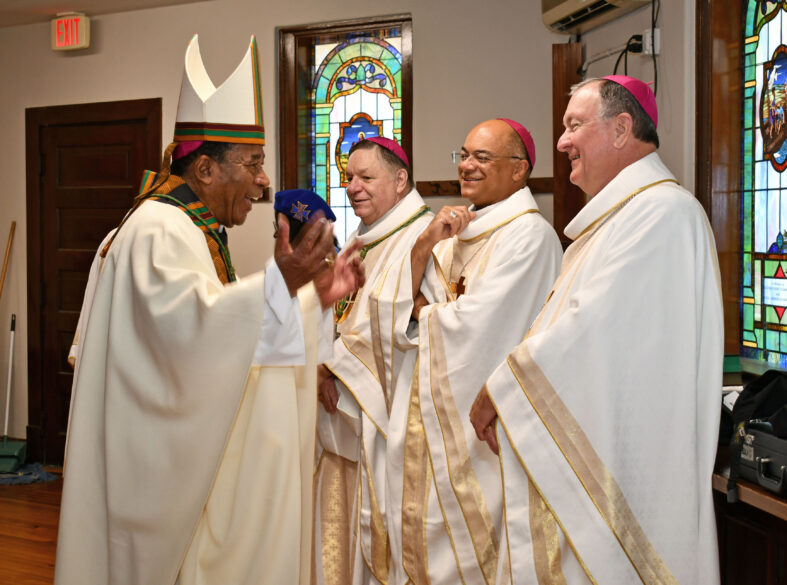In place of her “From the Archives” column, archivist and chancellor Mary Woodward requested to run this story from Gulf Pine Catholic on the centennial celebration of St. Augustine Seminary in honor of Black Catholic History Month.
By Terry Dickson
BAY ST. LOUIS – St. Augustine Seminary, the first seminary in the U.S. to train Black men for the priesthood, celebrated its centennial Oct. 29 with a special Mass on the seminary grounds.
Originally established by the Divine Word Missionaries as the Sacred Heart Preparatory Seminary in 1920 in the Mississippi Delta city of Greenville, the seminary relocated three years later to Bay St. Louis, located on the Gulf of Mexico between New Orleans and Biloxi.
On May 23, 1934, four men – Anthony Bourges, Maurice Rousseve, Francis Wade and Vincent Smith – were ordained to the priesthood at St. Augustine. Between its inception and closure in 1968, the seminary produced numerous priests, nine of whom later became bishops, including Joseph Bowers, SVD; Harold Perry, SVD; Carlos Lewis, SVD; Raymond Caesar, SVD; Joseph Francis, SVD; Curtis Guillory, SVD; Dominic Carmon, SVD; Leonard Olivier, SVD; and Terry Steib, SVD.

Bishop Steib, bishop-emeritus of Memphis, was principal celebrant of the Mass, which was concelebrated by 11 bishops, including Archbishops Thomas Rodi of Mobile; Gregory Aymond of New Orleans; Shelton Fabre of Louisville; Bishops Louis F. Kihneman III of Biloxi; Michael Duca of Baton Rouge; Douglas Deshotel of Lafayette; Anthony Taylor of Little Rock; and Guillory, bishop-emeritus of Beaumont.
“One hundred years ago on Sept. 16, 1923, the House Chronicle of St. Augustine Seminary described the formal opening day of the seminary as a ‘red-letter day in the annals of St. Augustine Mission House in Bay St. Louis, Mississippi.’ It was the day of dedication of this new mission house and, in the history of the Catholic Church among the Colored people of America, the day of the of the opening of the portals of the first seminary for young men of their race with a vocation to the priesthood, a day that will be long remembered as an epoch-making forward step,” said Bishop Steib.
“Now, one hundred years later, today is another red-letter day because we are celebrating the centennial year of this seminary, 100 years of preparing young Black men for the priesthood right here at St. Augustine. It is indeed and has been an epoch-making time. We celebrate and we praise God for this epoch-making time. We give thanks for the St. Augustine Seminary, a building that stood majestically and tall for over 75 years, a building where high school seminarians lived and studied, where African American students were trained and formed as they discerned a call to be priests and Divine Word Missionaries, despite the odds. We celebrate proudly how many religious teachers dedicated their lives to educating and forming these young men, how many religious brothers and laity worked and ministered here on this sacred ground 25 to a 100 years ago despite the odds.”
Bishop Steib imagined that, if the minor seminary building were still standing erect and could speak, it would mention how proudly the hundreds of alumni who graduated from here moved on.
“If the oak trees and the pine trees and the magnolia trees that have weathered the storms and hurricanes of past centuries and are still growing, the tress that sheltered the students over the years and are still growing could speak, they would say, ‘Look at all the hundreds who graduated from here, all who went to the novitiate and took vows and were ordained here, look at the first African-American priests to be ordained here – Father Bourges, Father Rousseve, Father Smith and Father Wade. They stood tall in the midst of segregated times. They were the men who stood tall, who served the Lord in some trying times. These are men who are role models for us.”
“How thankful are we that St. Arnold Jannsen, founder of the Divine Word Missionaries, would take to heart his own desire to proclaim the Gospel where it was not yet viable and dare to train African Americans to make it possible. How thankful are we that the (Society of the Divine Word) continues to proclaim the Gospel by calling forth vocations from all nations to serve in this Southern province.”
Father Paulus Budi Kleden, superior general of the Society of the Divine Word who traveled from Rome to take part in the centennial celebration, said although the seminary “has lost its function as a center to train African American candidates for the priesthood, its legacy remains.”
“It is a permanent call to fight against all kinds of segregation and discrimination, which, like a virus, can quickly enter a person or group without being fully aware of it and affects our way of thinking, judging and acting,” he said.
“In this sense, celebrating the 100th anniversary of St. Augustine Seminary is a privileged moment for all the members of the SVD to recommit ourselves to live and promote interculturality, which is our heritage, commitment and mission. The seminary stands for the Society’s dedication to actively participate in the efforts to eradicate the discrimination of race, religion, nationality, culture, and sexual orientation. At the same time, it calls for all of us to remain firm and consistent in this mission,” Kleden concluded.
“I think a second point to that is that seminaries be more welcoming, but also be sensitive to the different cultures of the people entering the seminary,” said Bishop Curtis Guillory. “One of the many things that we learned here at Divine Word Seminary was, first of all, acceptance of our culture and to see the beauty and the contributions of that culture. With that, we were not only able to be in the midst of other cultures but also learn from them and they from us.”
(Terrance Dickson is communications director and editor of the Gulf Pine Catholic for the Diocese of Biloxi.)
